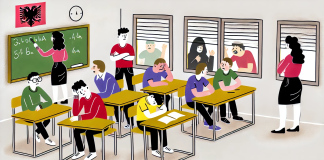Findings
–Escalation of tensions in the Balkans: The conflict in Ukraine and tensions between Kosovo and Serbia have raised concerns about a new conflict in the Western Balkans region.
–Political manipulation of the war narrative: Local leaders are using the fear of war through propaganda to gain political advantage and divert attention from internal problems.
–Increase in disinformation: Propaganda and misinformation about a potential war in the region are spreading, causing panic and insecurity among the public and undermining efforts for state-building and democracy.
-Role of the media: Local media and online portals are spreading false news and misinformation, exacerbating fear and tensions in the region, which could have serious public consequences.
Jona Plumbi
The phrase ‘war in the Balkans’ is one of the most frequently used in Albanian media. Especially during periods of heightened ethnic tensions, Albanian-language news headlines announce the outbreak of war.
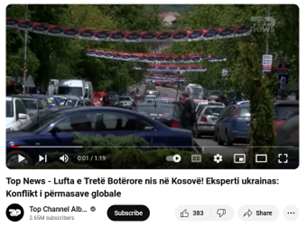
This situation has been ongoing for some time, but in recent years, it has escalated even further.
One of the main reasons is the war that Russia started in Ukraine, which refocused regional attention in the Western Balkans on the unresolved conflict between Kosovo and Serbia.
Since the beginning of 2022, the fear of a possible war between Serbia and Kosovo has spread like ‘wildfire’ in Albania, with some even exaggerating the situation to the expectation of a possible outbreak of World War III in the Balkans.
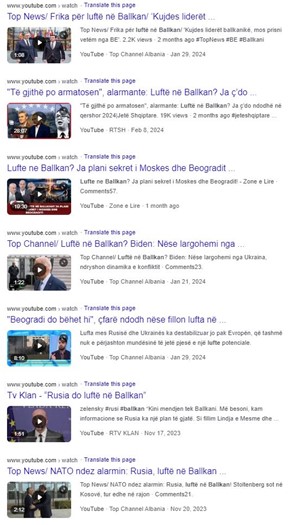
This reiterated thesis finds resonance in the Western Balkans for three main reasons, according to Ledion Krisafi, a researcher of international policies.
‘First, Russia, in an attempt to divert American attention from Ukraine and to force them to deploy military resources elsewhere, may seek to open new fronts of war around the world, with one potentially in the Balkans, in Kosovo or Bosnia and Herzegovina. Second, a possible Russian victory in Ukraine would embolden Serbs in Bosnia and in northern Kosovo to try to destabilize these states with Russia’s support, which is already victorious in Ukraine and more powerful. Third, it must be noted that the issues of state formation and national identities have not yet been fully resolved in the Balkans.’ – he argues.
How Politics Exploits the Narrative of War
The narrative of war is frequently utilized by local leaders in the Western Balkans.
‘Fear of war is also fueled by the observation of Russia’s similar efforts to increase its influence, whether overtly or covertly, in European political spheres,’ – explains Ermal Hasimja, a researcher of international relations.
According to him, recent years have seen Russia making efforts to enhance its influence in specific political factions in the Balkans, particularly in the post-Yugoslav context.
Krisafi believes that the fluid inter-ethnic dynamics in the Western Balkans region – considering Bosnia and Herzegovina and its dysfunctional state-building process, as well as northern Kosovo, which remains a hotbed of conflicts – breeds dissatisfaction among various political actors in the region. These actors, dissatisfied with the status quo, seek definitive solutions.
‘And the ultimate resolution in these cases is often reached through conflict and war‘ – Krisafi concludes his argument.
The Kosovo-Serbia situation presents its own complexities beyond potential Russian influences, explains Ermal Hasimja, emphasizing that this does not discount the effect of these potential influences.
‘Consciously, Serbia has sought to leverage the threat of aligning with Russia to gain diplomatic leverage with Western powers. So far, this tactic has yielded some success, as the threat is not trivial.’ – he argues.
Conversely, for politicians in the region, tension is preferable to peace and stability – explains Ledion Krisafi, noting that this is their way of diverting attention from internal challenges such as corruption, law enforcement, and the functioning of democracy.
‘These politicians understand that nationalism ‘sells’ in the Balkans and they endeavor to exploit it to the fullest.’ – says Ledion Krisafi.
The Role of the Media
Political propaganda that ‘calls for war’ by exploiting internal ethnic issues is often magnified as a result of the race to gather more clicks and increase the number of online portals functioning as ‘copy-paste journalism’. The European Commission reported that there were over 800 portals in Albania by the end of 2023.
Nevertheless, in Albania, the primary source of publishing these narratives remains the major media outlets in the country. Faktoje has analyzed and debunked the spread of the narrative of ‘the onset of war in the Balkans’, which is disseminated in the form of ‘clickbait headlines’.
- Who is sounding the war drums in Kosovo?
- The return of the ‘Balkan war’ ghost
- The US Intelligence Report did not predict a war in the Balkans
- Misinformation with Dodik’s statement spreads headlines about a ‘new war’
- ‘The chances of Republika Srpska joining Serbia are zero!’
These news pieces are more widely spread during situations of regional disagreements, directly resulting in ethnic-based misinformation.
This was the case in May 2023 when clashes between the blue uniforms and Kosovo Serbs erupted in northern Kosovo, following dissatisfaction with the partial elections in the Serbian-majority municipalities of Kosovo.
At that time, the Albanian government’s position in this conflict was that of an intermediary. Prime Minister Edi Rama proposed to the international community a draft for the creation of the Association of Serbian Municipalities in Kosovo, without prior consultation with the Kosovo government. This move was viewed unfavorably by Kosovo. The situation escalated further after Prime Minister Edi Rama canceled the joint meeting of the two governments.
Ermal Hasimja considers the problems in the relationship between Kosovo and Albania as clashes between the different national objectives of the two politicians who are unable to manage the differences with maturity
‘Edi Rama is in an unfavorable position because his positions are taken for another sovereign state and himself, not only does he not pay any cost for them, but he even benefits by showing allegiance to Europe in exchange for the supposed support and recognition from the latter.‘ – explains Hasimja.
Following these developments, there was an increased number of misleading news about the relationship between Albania and Kosovo, some of which were debunked by Faktoje.
- Rama’s irony was not directed at Prime Minister Albin Kurti
- The misinterpreted map of Kosovo in the office of European rapporteur Lajčák
- SHISH responds to Vlora Hyseni
The situation repeats itself in subsequent cases of increased tension in the region.
- Vučić’s statement that EULEX was not involved in the action in northern Kosovo was false
- The attack in Banjska and the disinformative narratives
- Kurti’s visit to RMV revived ‘Greater Albania’ on the Serbian propaganda map
- Misinformation with the news of Vučić’s son being detained by the Kosovo Police
- There is neither ethnic cleansing nor exodus of Serbs from Kosovo
Dissemination Statistics of Disinformation
The spread of misinformation due to contentious issues in the regional or national context is notably high in all member countries of the European Fact-Checking Network EFCSN.
As observed from the network’s database, national issues within the regional context generate a significant amount of misinformation, second only to the aftermath of the conflict in Ukraine.
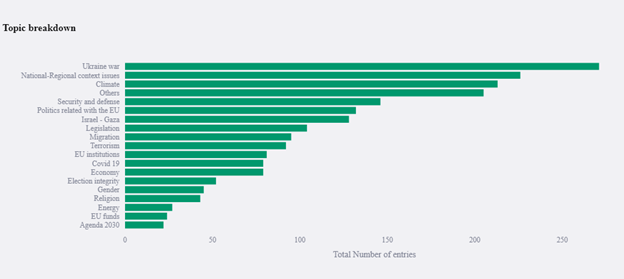
Out of a total of 1357 articles debunked by fact-checkers in this network, 226 are specifically related to this issue, making up roughly 17% of all debunked news.
In the research focused on the Western Balkans region (Albania, Bosnia and Herzegovina, Serbia, North Macedonia), regional and national issues account for 11% of the news debunked by the EFCSN network.
The majority of articles in the Western Balkans regarding national and regional issues are blatant misinformation. Out of 10 articles verified on this issue since the start of the war in Ukraine, 6 of them are completely false.
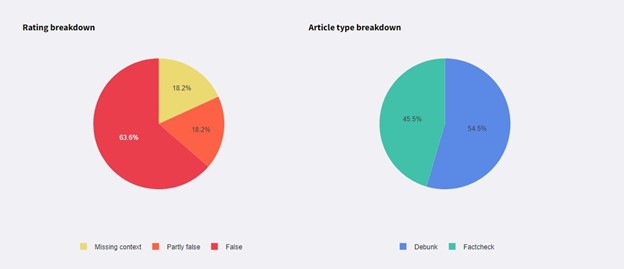
Conclusion
While public awareness of the risk of artificially imported conflicts helps expose such intentions, leading to their prevention, the dissemination of misinformation about a potential war in the region has significant consequences on the public.
They create widespread panic and insecurity among the population – explains Ledion Krisafi.
‘They also greatly impact the efforts of Balkan populations to emigrate to the West, as they live in a region where the media report daily that war is imminent. Additionally, they undermine state-building and democratic efforts in the region by casting doubt on the existence and future of states like Kosovo and Bosnia and Herzegovina. It is difficult for individuals to plan their future in a state whose existence and future are constantly questioned.’ – he argues.






